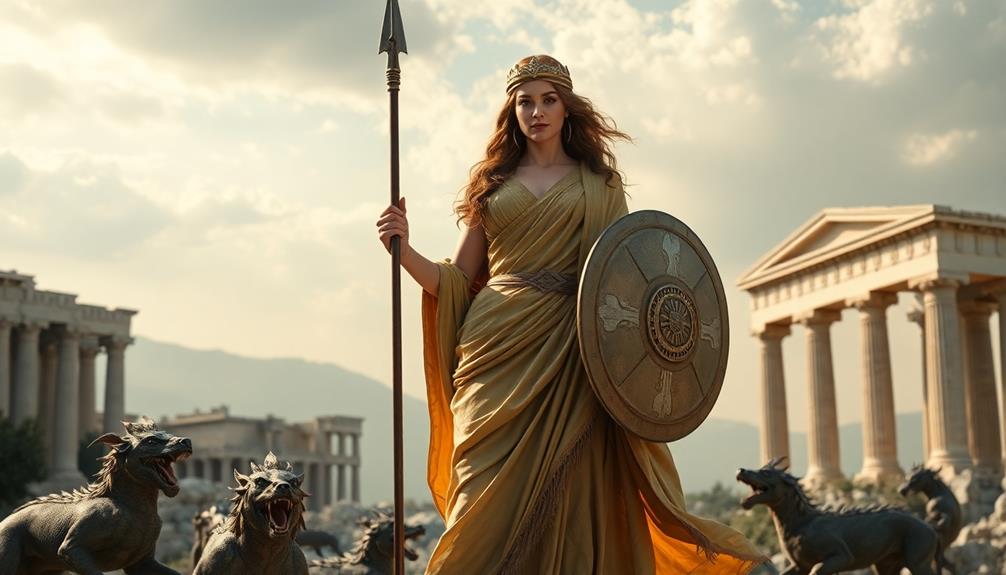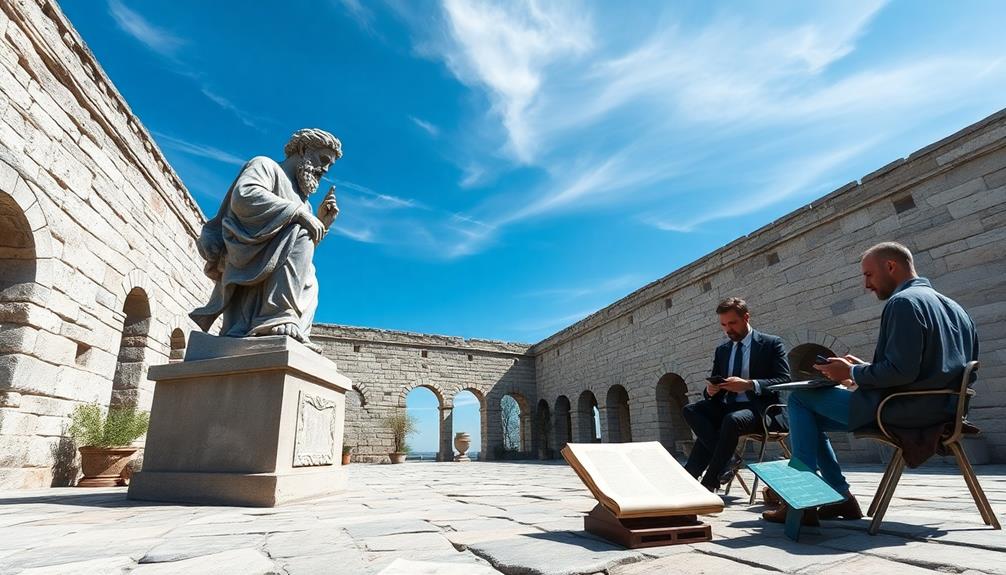In Greek mythology, women often challenge traditional roles, revealing their strength and complexity. You see characters like Antigone and Medea defying societal norms, embracing rebellion against patriarchal authority. Figures such as Athena and Hera embody power and wisdom while juggling their expected roles. Even Medusa transforms from a victim into a symbol of resilience. These narratives don't just portray women as passive; they highlight their struggles for agency and recognition. If you explore further, you'll uncover how these powerful stories resonate with modern themes of female empowerment and resistance against oppression.
Key Takeaways
- Greek mythology often simplifies female characters, but figures like Clytemnestra and Antigone challenge traditional gender roles through their acts of defiance.
- Powerful goddesses like Athena and Hera exemplify women's strength and agency while navigating patriarchal expectations, showcasing complex identities beyond mere support roles.
- Medusa's transformation from victim to symbol of resilience highlights the reclamation of female narratives and empowerment against societal norms.
- Myths reflect women's struggles for agency, with characters like Demeter and Medea representing rebellion against male authority and societal oppression.
- Contemporary movements, such as #MeToo, draw inspiration from mythological figures, emphasizing the ongoing relevance of women's empowerment and resistance in modern society.
Historical Context of Women

What defines the historical context of women in ancient Greece? Women lived in a patriarchal society that relegated them to roles seen primarily as daughters, wives, or mothers. This framework limited their rights and responsibilities, reinforcing a significant gender disparity.
In Greek mythology, female characters often reflect these societal norms, depicting them in one-dimensional roles, while male figures enjoy more complex narratives. Historical narratives around figures like Clytemnestra and Medea reveal women's resistance to the oppression they faced. Both characters challenge the expectations placed upon them, demonstrating that women could defy their marginalized status.
Despite this prevailing oppression, powerful goddesses such as Athena and Hera emerged as complex figures. They both adhered to and subverted societal expectations, showcasing strength and agency.
These women in mythology serve not only as reflections of their historical context but also as symbols of resistance against the constraints of their time. By examining these narratives, you gain insights into how women navigated their roles within a patriarchal framework, often challenging the very norms that sought to define them.
Their stories remind us of the enduring struggle for agency and recognition throughout history.
Strong Female Archetypes

Throughout Greek mythology, strong female archetypes stand out, challenging the traditional roles assigned to women in their society.
Athena, the goddess of wisdom and warfare, exemplifies this strength with her strategic prowess and role as the protector of Athens. Hera, as the queen of the gods, embodies authority and power, maneuvering challenges from both divine and mortal spheres to uphold her status.
Meanwhile, Aphrodite demonstrates the complexities of female influence through love and desire, showing how women can shape human affairs.
Mortal heroines like Atalanta break away from patriarchal norms, showcasing their independence and strength through exceptional hunting skills and defiance of societal expectations.
Antigone further embodies resilience; she defies authority to uphold her family's honor, illustrating the capacity for women to challenge oppressive structures.
Together, these figures create a rich tapestry of empowered women who assert their identities and agency. They refuse to be relegated to passive roles, instead asserting their power and independence in a world dominated by male figures.
The stories of these strong female archetypes continue to inspire and resonate, reminding us of the enduring strength of women throughout history.
Myths of Resistance and Rebellion

Greek mythology is rich with stories of women who resist and rebel against male authority, showcasing their strength and agency in a patriarchal world. Characters like Clytemnestra and Medea embody rebellion against societal norms through acts of vengeance and defiance. Clytemnestra avenges her husband's betrayal, while Medea challenges the male-dominated narrative by taking drastic measures when wronged. Their stories highlight the struggle against patriarchal oppression and assert the power of female agency.
Moreover, myths of Demeter and her daughter Persephone illustrate resistance against male dominance. Demeter defies Zeus's wishes to protect Persephone, asserting her maternal strength.
Similarly, Medusa transforms from a victim of assault into a symbol of resilience, representing how narratives of female suffering can evolve into powerful acts of resistance.
These tales reflect society's fears regarding empowered women, as seen in the vilification of figures like Medea. Yet, they also challenge the status quo, showcasing women's struggles against societal norms.
Through these myths, you see that Greek mythology not only portrays female characters' suffering but also celebrates their strength and the spirit of rebellion against oppressive structures.
The Complexity of Female Roles
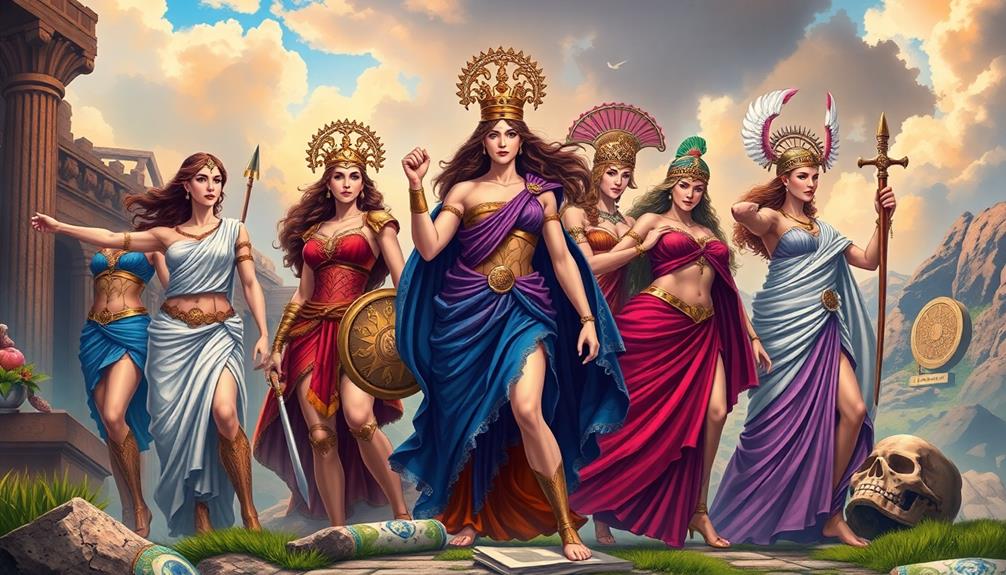
How do the roles of women in Greek mythology reveal the complexities of their identities? Female characters in Greek myths often fit into rigid categories like daughter, inamorata, and mother, which oversimplify their true nature. While figures like Penelope and Helen are celebrated for loyalty and beauty, they often remain confined to supporting roles that reinforce societal expectations.
In contrast, powerful sorceresses and strong-willed characters like Clytemnestra and Antigone embody resistance against oppression, challenging patriarchal norms and showcasing their moral agency.
The portrayal of mothers, such as Niobe, frequently emphasizes a limited maternal identity, depicting them as passive figures rather than exploring their full emotional depth.
However, feminist reinterpretations of these myths encourage a reevaluation of these female characters, revealing the complexities beneath their surface roles. Through this lens, you can see that women in Greek mythology aren't merely defined by their relationships to men but possess their own narratives filled with strength and agency.
Symbols of Strength and Justice
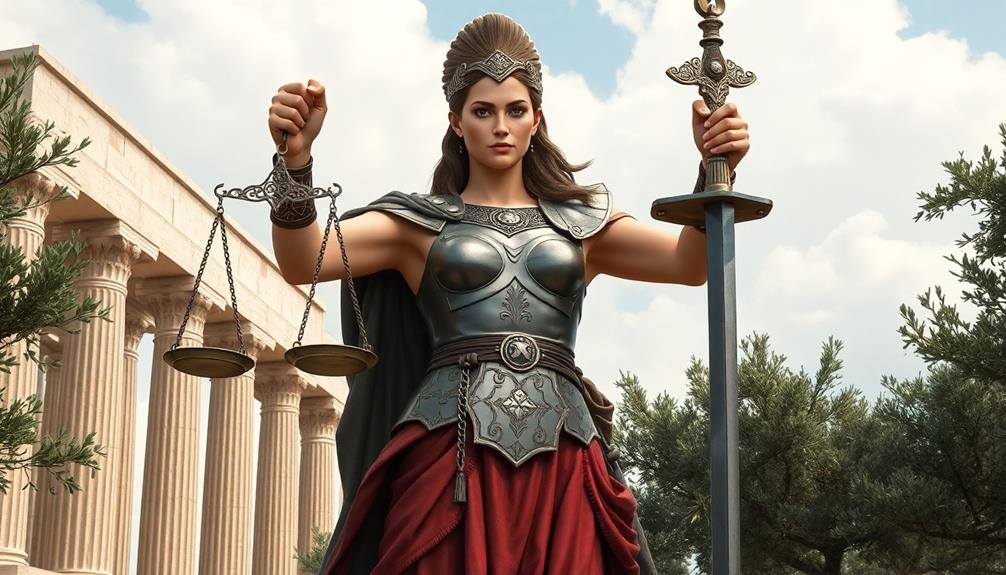
In exploring symbols of strength and justice, you'll find that figures like Medusa, Antigone, and Clytemnestra challenge traditional narratives.
Medusa's transformation into a symbol of resilience resonates with modern themes of empowerment, while Antigone's defiance against male authority showcases moral courage.
Clytemnestra's quest for vengeance highlights the complex ways women assert their agency in a patriarchal world.
Medusa's Empowerment and Resilience
Medusa's transformation from a beautiful maiden to a feared monster isn't just a tale of tragedy; it's a powerful narrative of empowerment and resilience. Initially victimized by trauma and sexual assault, she embodies the societal blame that often burdens women.
However, her story transcends victimization, illustrating a profound transformation into a figure of strength. Luciano Garbati's statue reimagines Medusa as a powerful woman confronting her aggressor, Perseus. This portrayal challenges traditional gender roles and stereotypes, emphasizing female agency.
In contemporary society, Medusa's legacy resonates deeply, especially with the #MeToo movement, which embraces her as a symbol of resilience for survivors of sexual violence.
Medusa's narrative highlights the struggle against societal injustices, offering a lens through which to view the fight for justice. By reclaiming her image, you see how mythological figures can inspire modern movements for equality.
This powerful transformation from victim to a symbol of strength underscores the ongoing conversation around women's rights and empowerment. In embracing Medusa's story, you recognize the importance of resilience and the necessity of challenging societal norms that seek to diminish female agency.
Antigone's Moral Defiance
The journey of women in Greek mythology reveals not only the struggles against oppression but also the profound strength they embody. One of the most striking figures is Antigone, who exemplifies moral defiance against patriarchal authority. By choosing to bury her brother Polyneices, she prioritizes familial loyalty over the edicts of King Creon, asserting her values amidst societal constraints.
This act of courage highlights her unwavering commitment to justice, showcasing female agency in a male-dominated world. Antigone's actions challenge traditional stereotypes, as she embodies the essence of feminist resistance.
Her willingness to face death for her beliefs underscores the tragic costs of standing up for what's right. In Greek mythology, Antigone emerges as a complex character, breaking free from the confines of her time.
Clytemnestra's Vengeful Justice
Vengeance fuels Clytemnestra's powerful narrative in Greek mythology, showcasing her as a formidable force against patriarchal tyranny. Driven by maternal vengeance, she takes a stand against the injustices inflicted upon her family, particularly the sacrifice of her daughter, Iphigenia. Her act of murdering her husband, Agamemnon, challenges the traditional gender roles that restrict female power and agency.
- A blood-red cloak draped over her shoulders, symbolizing the weight of her choices
- The glint of a dagger, representing her unwavering strength in pursuit of justice
- The echo of her children's cries, haunting her as she seeks retribution
- The shadow of the palace, a reminder of the patriarchal authority she defies
- A throne left unoccupied, illustrating her claim to power in a male-dominated world
Clytemnestra's legacy reflects the complexities of familial loyalty and the moral ambiguities surrounding vengeance. She stands as a symbol of female power, illustrating how one woman's fight against societal injustices can reshape the narrative, challenging the very foundations of patriarchal authority.
Through her actions, Clytemnestra becomes an empowering figure for those who resist oppression.
Modern Relevance of Mythology
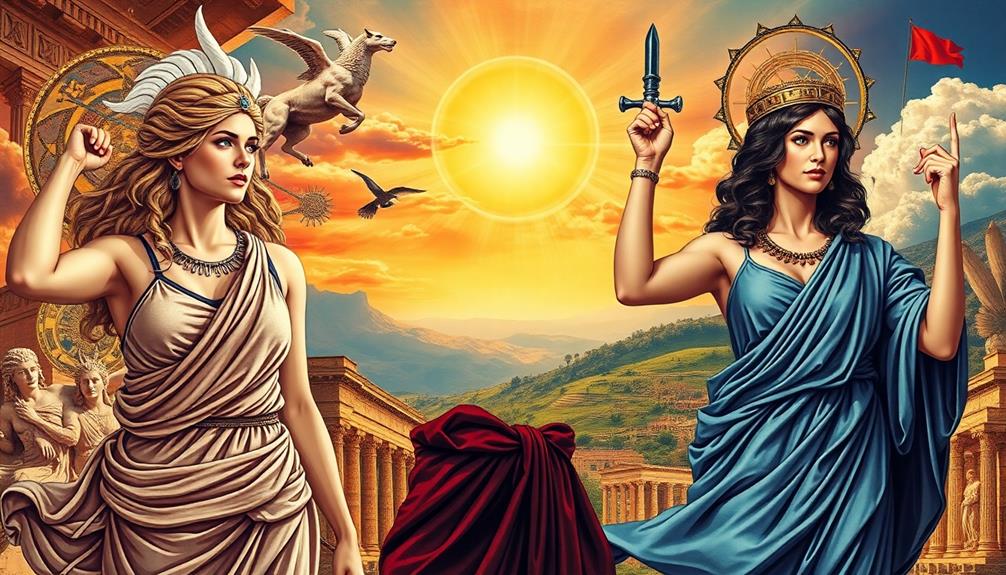
Greek mythology isn't just a collection of ancient stories; it remains a powerful lens through which we can examine contemporary issues, especially those surrounding women's rights and identity. Today, themes of female empowerment and resistance against patriarchal norms resonate deeply in modern feminist discourse. Powerful female figures like Athena and Hera challenge traditional gender roles, inspiring feminist reinterpretations that reflect ongoing struggles for equality.
The vibrational energy of these mythological figures can be likened to the importance of self-acceptance in our modern lives, as they embody strength and resilience.
Consider how characters like Medusa have evolved from symbols of fear to icons of resilience, particularly in movements like #MeToo. This transformation showcases the complexities of identity and agency, empowering survivors of sexual violence and influencing cultural narratives.
Young activists like Malala Yousafzai and Greta Thunberg embody the spirit of rebellion found in heroines like Antigone and Medea, drawing parallels that highlight the timeless nature of these stories.
In literature and film, mythological references spark critical discussions about societal expectations, encouraging us to question established norms. By engaging with Greek mythology, you can find inspiration and insight that fuel the fight for women's rights today, reminding us that these ancient tales still hold relevance in our modern world.
Impact on Contemporary Activism

Mythological narratives have a profound influence on contemporary activism, especially regarding women's rights. Strong female figures from Greek mythology, like Antigone and Medea, serve as powerful archetypes of resistance. These characters inspire you to challenge the patriarchy and fight for justice in today's world.
The emotional manipulation faced by these heroines can be likened to the struggles many women encounter in narcissistic relationships, where their voices are often silenced. By recognizing these narcissistic behaviors, you can better understand the importance of standing up for oneself against oppression.
- Antigone's defiance against unjust laws
- Medea's complex morality and empowerment
- Medusa's reinterpretation as a symbol of strength
- Malala Yousafzai and Greta Thunberg's echoes of historical resistance
- The celebration of female voices in activism
These themes of rebellion and moral integrity resonate deeply in your activism. The reinterpretation of characters encourages you to recognize and dismantle the stereotypes that persist in society.
Modern movements, like #MeToo, illustrate how survivors reclaim their narratives, aligning with the stories of women in Greek mythology. Young activists draw on these powerful narratives to highlight their struggles for education and climate justice, emphasizing that the fight against oppression is ongoing.
Frequently Asked Questions
What Are the Stereotypes of Women in Greek Mythology?
Women in Greek mythology often fit stereotypes like the devoted wife, the beautiful temptress, or the vengeful mother. These roles restrict their complexity, showcasing societal expectations that prioritize loyalty and beauty over individual strength and ambition.
What Is the Role of Women in Greek Society?
In ancient Greek society, women often found themselves in nurturing roles, embodying the ideals of devotion and domesticity. They primarily served as daughters, wives, and mothers, steering through a world where their agency was frequently overlooked or constrained.
How Were Women Portrayed in Greek Plays?
In Greek plays, women were often portrayed as limited characters, like wives or mothers, yet some, like Clytemnestra and Antigone, challenged norms, showcasing strength and resistance against male authority, despite being labeled villains.
What Is the Gender Conflict in Greek Mythology?
Imagine a powerful goddess like Hera, constantly undermined by male deities. This gender conflict in Greek mythology showcases how female strength is often overshadowed, reflecting societal tensions between female autonomy and patriarchal dominance throughout the narratives.
Conclusion
In the tapestry of Greek mythology, women weave threads of strength, defiance, and complexity that shimmer with relevance today. By challenging stereotypes and embracing their multifaceted roles, these mythic figures inspire you to break free from societal confines. As you navigate your own journey, let the echoes of these powerful archetypes resonate within you, igniting a fire for justice and empowerment. The stories of the past aren't just ancient tales; they're your call to action in the modern world.
